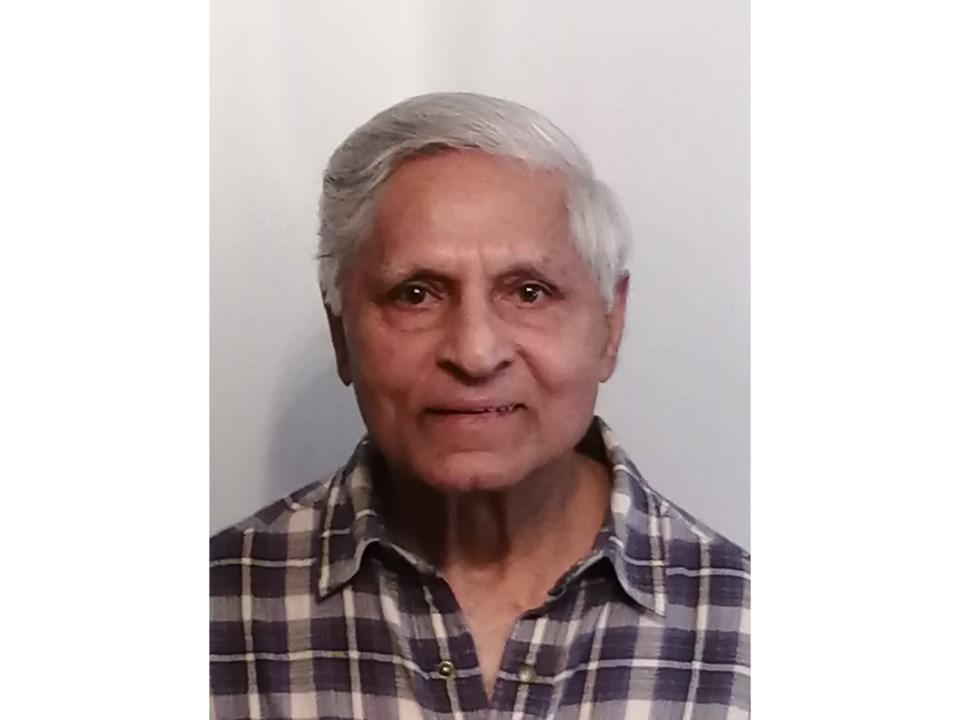Collingwood resident Shah Mohammed has had many jobs in his life, as a means to support his family after they immigrated to Canada from Trinidad in 1968.
For this week’s edition of People of Collingwood we spoke with Mohammed, retiree and member of the Unity Collective.
Q: For how long have you lived in Collingwood?
A: About 20 years.
I immigrated from Trinidad to Canada in 1968. When I came to Canada, I went to Barrie. I lived there for seven years, and then we moved to Wasaga Beach for about 20 years. After that, I came to Collingwood.
Q: Back in 1968, what made you want to immigrate to Canada?
A: Well, I’m the eldest of 12. I married very young. I had two boys then, and I wanted a better life for them.
Q: Can you talk about those early days in Canada? What did you do when you came here?
A: I started at General Tire Co. in Barrie. In the ’60s and ’70s, it was easy to find a job. That’s where I stayed for those seven years.
Q: What made you want to make the move further north to Wasaga Beach?
I found I wasn’t getting ahead. When I came to Canada, I only had a high school education. I wanted to improve on myself. I started attending Georgian College the first year I was here. It was also my way of meeting people.
I also went to Humber College in Toronto at night to get a certificate in industrial engineering.
I got a job at the (Kaufman) Furniture Factory here in Collingwood as an estimator. I worked there for about four years, and then started to look around again.
I managed to get a job in my own field at Shopsy’s Food in Toronto, but after a while, the drive from Wasaga Beach to Toronto started to get to me.
I got a job at a carpet store in Collingwood, and worked there for about 14 years. When that closed, I had to look for another job.
I opened my own dollar store. They were an up-and-coming thing. I called it More for Less. It was on Hurontario Street across from Loblaws.
When I opened, less than a month later, two others opened up in town. I couldn’t keep up. After three years, I had to give it up.
Then, I started to drive for the Red Cross in town. I did that for 16 years.
Q: You joined up with the Unity Collective this year. Where did you first hear about the Unity Collective, and what made you want to join up?
A: When I lived in Barrie, I helped out with the local Cub group through Scouts Canada. I really liked it. I had no opportunity to do that kind of stuff when I was growing up in Trinidad.
When I moved to Wasaga, I also enrolled my two boys in hockey, and volunteered as part of the minor hockey association. I was part of the recreation committee in Wasaga Beach.
I’ve always been interested in volunteering.
Carolynn Wilson was one of my son’s teachers in Wasaga Beach, so I know her well. When the Unity Collective started, she encouraged me to join.
Q: Have you personally ever experienced issues of racism or equity in your own life?
A: People have tried to call me... whatever.
But it was always under the surface.
I just never let it bother me. There were some times when it did.
There was one incident that really bothered me for years and years. When I first moved to Wasaga Beach, there was a pop shop. My kids loved it.
I was at a gas station in Wasaga Beach on the way. I walked to the back of the store, and someone there did not say anything to me. He (approached), grabbed me by the back of the neck and walked me back to my car.
It was little incidents like that.
Q: What would you say you bring to the Unity Collective table?
A: I relate to the Indigenous experience. When I was growing up, Trinidad was governed by the British. At that time, Britain ruled the world. In all the tropical countries they owned, they grew sugar cane. Slaves worked on the plantations in Trinidad.
When I was growing up, we weren’t taught in school about our history. I never knew that my grandparents were brought over by the British to work in the plantations. They were considered to be indentured servants.
In my village, nobody spoke about where they came from, because there was a culture of... being seen, but not heard.
You were not encouraged to ask questions.
By my name, I’m sure you can tell I’m Muslim. But we never knew where our grandparents were from. They may have been from India, or they may have been from Bangladesh or Pakistan. I have no way of knowing, because my last name – Mohammed – is like Smith.
Q: When you look ahead, what are your hopes for what the Unity Collective will accomplish?
A: I’d like to let people know that I am as Canadian as anybody else. People of different religions and cultures should all be accepted as equals.
Q: Is there anything else you’d like people in Collingwood to know about you?
A: I teach yoga. I retired at the beginning of COVID-19. I have coffee with friends. I cycle. I visit family.
I am part of this community. With the influx of retirees from elsewhere coming into town, we are all one.
For our feature People of Collingwood, we’ll be speaking with interesting people who are either from or are contributing to the Collingwood community in some way, letting them tell their own stories in their own words. This feature will run on CollingwoodToday every weekend. If you’d like to nominate or suggest someone to be featured in People of Collingwood, email [email protected].



